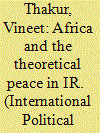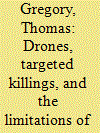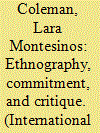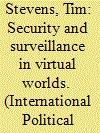|
|
|
Sort Order |
|
|
|
Items / Page
|
|
|
|
|
|
|
| Srl | Item |
| 1 |
ID:
141298


|
|
|
|
|
| Summary/Abstract |
This article responds to the debate on “The End of IR Theory?” that appeared in a recent volume of the European Journal of International Relations. It argues that the pronouncements about “theoretical peace” carry the subtext of “epistemic violence,” foreclosing the debate and the possibility of theoretic interventions emerging from the non-West—in this case, Africa. Elucidating how IR theory (IRT) has remained a parochial enterprise by the deliberate silencing of Africa, the article then finds pathways by which Africa can contribute to IRT. Using the metaphor of storytelling, it lists eight different ways in which Africa can tell new stories in IR.
|
|
|
|
|
|
|
|
|
|
|
|
|
|
|
|
| 2 |
ID:
141297


|
|
|
|
|
| Summary/Abstract |
The debate about drones has largely taken place on a legal terrain with various politicians, lawyers, and activists all seeking to establish whether or not targeted killings are legal under the existing framework of international law. In particular, they have raised concerns about the geographical and temporal scope of the “war on terror,” the legal status of those being targeted and whether or not these strikes can be considered discriminate, proportionate, and necessary. The aim of this article is not to settle these legal questions once and for all but to think about the limitations of framing the use of drones as a legal issue rather than an ethical, moral, or political concern. I will argue that the emphasis on international law distracts attention away from the horrors of war by masking the pain and suffering that is caused in favor of technical debates about the application of particular legal codes. Drawing on the work of Judith Butler, Adriana Cavarero, and Elaine Scarry, I will argue that we need to turn our attention back to the embodied experiences of those affected.
|
|
|
|
|
|
|
|
|
|
|
|
|
|
|
|
| 3 |
ID:
141301


|
|
|
|
|
| Summary/Abstract |
This article addresses the vexed question of relations between critique and political struggle. As emphasis upon the “impact” of research increases, possibilities of integrating research into practices of resistance have been highlighted. Such approaches lend themselves to ethnographic methods, with scholars engaged in these ways offering nuanced reflections on possibilities of “bridging gaps” between research and solidarity. Here, however, I draw on over a decade of “activist” ethnography to highlight risks of conceptual enclosure associated with this move. The politics of struggle are quickly erased through available categories and problematics, which are readily absorbed into existing constellations of power. By contrast, the gaps between solidarity and writing provide spaces for emergence of a critical attitude—along lines sketched by Foucault. Nevertheless, to “apply” Foucault to this sort of ethnography carries a risk of betrayal. Foucault's critical ethos can be neither starting point nor end of engagement with actually existing struggles. Inspired by the philosophical tradition in which Foucault's work was rooted, I advocate a practice that gives weight to ontologies emerging from struggle as conjectures perpetually in question. This implies not closing gaps but a persistent back-and-forth between critique and commitment—risking ourselves as subjects at both ends.
|
|
|
|
|
|
|
|
|
|
|
|
|
|
|
|
| 4 |
ID:
141299


|
|
|
|
|
| Summary/Abstract |
Virtual worlds, persistent online spaces of social interaction and emergent gameplay, have hitherto been neglected in International Studies. Documents disclosed by Edward Snowden in December 2013 suggest that intelligence agencies, including the US National Security Agency and the British Government Communications Headquarters (GCHQ), have been less reticent in exploring and exploiting these environments for signals and human intelligence. This article introduces virtual worlds as sociological sites in the matrix of international politics and explores how the intelligence community (IC) has conducted operations in these environments, principally for counterterrorism purposes. Reconstructing the activities of the IC shows how virtual worlds have been drawn into the ambit of state surveillance practices, particularly as a means to generate intelligence from virtual-world behaviors that correlate with, and predict, “real-world” behaviors indicative of terrorism and other subversive activities. These intelligence activities portend a general colonization by the state of previously unregulated interstices of the sociotechnical Internet and their analysis contributes to our understanding of the relationship between government and the Internet in the early twenty-first century.
|
|
|
|
|
|
|
|
|
|
|
|
|
|
|
|
| 5 |
ID:
141300


|
|
|
|
|
| Summary/Abstract |
This paper seeks to contribute to the growing body of critical scholarship that extends cosmopolitanism beyond its Kantian conceptions in International Relations (IR). It examines the promise of the ubuntu philosophy which is popular in South Africa and asks whether it can lead to what Pieterse (Development and Change, 37, 2006, 1247) calls “emancipatory cosmopolitanism.” Using Wiredu's (1996) “sympathetic impartiality,” the paper explores insights from this indigenous ubuntu philosophy to critique dominant conceptions of cosmopolitan thought in IR.
|
|
|
|
|
|
|
|
|
|
|
|
|
|
|
|
|
|
|
|
|